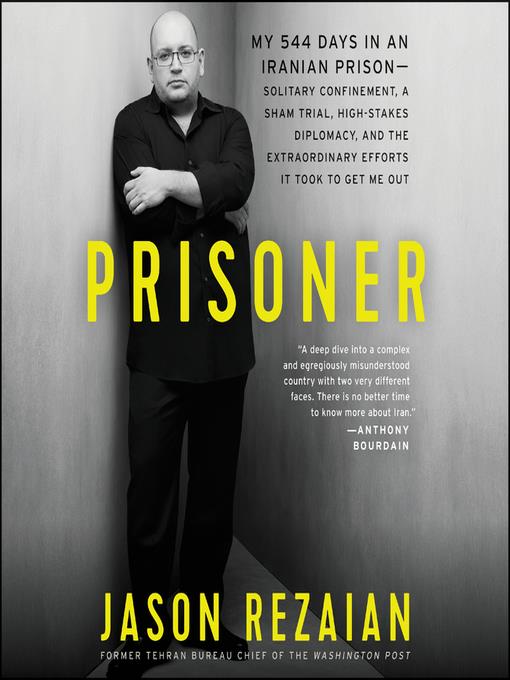
Prisoner
My 544 Days in an Iranian Prison—Solitary Confinement, a Sham Trial, High-Stakes Diplomacy, and the Extraordinary Efforts It Took to Get Me Out
کتاب های مرتبط
- اطلاعات
- نقد و بررسی
- دیدگاه کاربران
نقد و بررسی

Jason Rezaian gives voice to his harrowing story of arrest and imprisonment in Iran. He is steady and unflinching as he describes the first moments of being accused of spying for the U.S. while serving as the WASHINGTON POST's bureau chief in Tehran. This is a detailed account of one Iranian-American's love affair with the land of his heritage and how it goes horribly wrong due to the suspicions of its government. Rezaian recounts the many interrogations he was subject to, alternating between his own perspective and that of the security forces in believable exchanges. Fans of current events and global politics will find this a riveting listen. We are with Rezaian every minute of his perilous journey. M.R. � AudioFile 2019, Portland, Maine

August 1, 2018
In July 2014, Rezaian was serving as Tehran bureau chief for the Washington Post when he was arrested by Iranian police and accused of spying for America. He ended up in prison for 18 months, used as a bargaining chip in negotiations for the Iran nuclear deal even as his family lobbied for his release and #FreeJason boomed on social media. This memoir reflects not only on his imprisonment but his childhood in California and his close bond with his rug merchant father. With a 100,000-copy first printing.
Copyright 2018 Library Journal, LLC Used with permission.

February 1, 2019
It was a risk-taking spirit that compelled Iranian American journalist Rezaian to travel to Iran to cover local politics, culture, and food for the Washington Post. This decision changed his life in many ways, including his meeting future wife Yegi. After being married a little more than a year, the couple decided to leave Iran for the United States. In July 2014, they were set to depart in a few days' time, when they were arrested. Here, Rezaian records the grueling 544 days he spent in Tehran's Evin Prison, with Yegi incarcerated for some of that time as well. He recounts the disorienting and desolate experience of solitary confinement for several months, when he came to look forward to interrogations as his sole form of human contact. Throughout this ordeal, Rezaian's sharp, sarcastic wit helped keep him sane by allowing him to maintain perspective as he faced increasingly strange allegations. VERDICT Rezaian balances and depicts well his love/hate relationship with the former homeland of his father. His unique experience and determined personality will inspire admiration for his hard-won battle. [See Prepub Alert, 7/30/18.]--Stacy Shaw, Denver
Copyright 2019 Library Journal, LLC Used with permission.

January 1, 2019
Washington Post opinion writer and CNN contributor Rezaian recounts his 544 days of imprisonment at the hands of the Iranian regime.A native of Iran whose family had immigrated to the United States decades earlier, the author moved to Tehran to head the Washington Post bureau there. It was a good gig, well paid in dollars, while, because his wife was an Iranian citizen, they were allowed to pay in local currency. "Life was good," he writes. Although he favored local-color stories, often about food, and guided Anthony Bourdain through the city for an episode of Parts Unknown (this book is published under Bourdain's imprint), he still managed to fall afoul of the secret police. The charge eventually cooked up for him was definitively Orwellian: "As a member of the American press writing what could only be perceived as neutral stories about Iran, I was attempting to soften American public opinion toward the Islamic Republic"--a softening that would allow American values to circulate within the country. After developing strategies to avoid despair while in solitary confinement ("if you're lucky you learn to quiet your mind, just a little, and live softly"), Rezaian could do little more than wait it out even as Iranian agents threatened to add time to his sentence because his mother was publicly protesting his imprisonment. "Why is your mother coordinating with the BBC to ruin your life?" asked one. The author credits a concerted campaign on the part of Post editor Martin Baron, his brother, and other intermediaries for his release after having been "the plaything of some of the nastiest authoritarian ideologues to roam the earth in many decades." Rezaian also allows that one of his captors got at least one thing right: He correctly predicted the outcome of the 2016 election in the U.S., saying, "Trump is the candidate that hates Muslims most."Of interest to students of the Iranian system as well as free-press advocates.
COPYRIGHT(2019) Kirkus Reviews, ALL RIGHTS RESERVED.

























دیدگاه کاربران